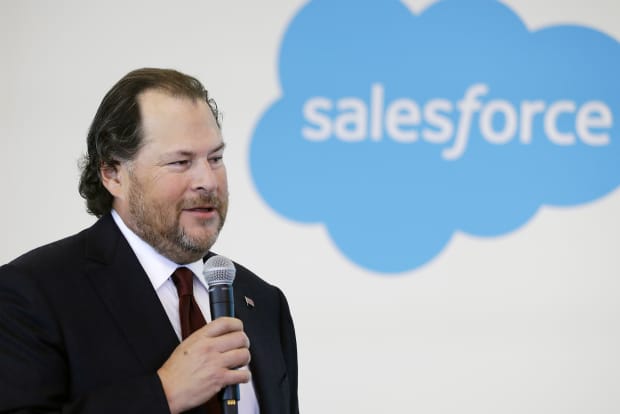This post was originally published on this site

Salesforce Chairman and CEO Marc Benioff speaks during a news conference in Indianapolis in May 2019.
Associated Press
With a $27.7 billion deal to buy Slack Technologies Inc. — its biggest acquisition yet — Salesforce.com Inc. is poised to become an even bigger threat to Microsoft Corp. in the world of corporate software. But it could be its toughest merger yet.
As expected after reports emerged last week, Salesforce CRM, -1.81% on Tuesday said it reached an agreement to buy Slack Technologies Inc. WORK, +2.23% for $27.7 billion in cash and stock. Slack, which went public in 2019, is known for its corporate-focused instant-messaging system. The deal is expected to close in Salesforce’s second quarter of fiscal 2022, which is next July.
The deal will give Salesforce its biggest competitor yet to Microsoft, which offers the competing Teams messaging service. Salesforce said that combining its Customer360 platform with Slack will be “transformative for customers and the industry.”
Salesforce though, faces some pressure with this deal. Slack has been under serious recent pressure from the faster-growing Microsoft Teams, even as demand for both products has increased with more employees working from home during the pandemic.
“To illustrate [Slack’s] plight, the company had 12 million daily active users (DAUs) as of Sept. 2019. Meanwhile, Teams overtook [Slack] with 13 million DAUs two months prior to that,” Mizhou Securities analysts said in a recent client note. “[Teams] has since exploded to over 75 million DAUs as of 4/29/20, and over 115 million DAUs as of last month.” Slack has not updated its daily active users since last fall, a move interpreted by many as a sign of weak growth.
Evercore ISI Securities analyst Kirk Materne had similar thoughts. “The problem is even with Salesforce’s heft in the enterprise market, competing with Microsoft Teams in its core market is going to be extremely difficult, and convincing investors of the merits of this deal will be challenging,” he wrote. Materne also noted the deal may remove much of the goodwill Salesforce has with investors and create a new “overhang” on the stock.
According to Salesforce founder and Chief Executive Marc Benioff, the deal was brought to him by Slack CEO and co-founder Stewart Butterfield and Salesforce President Bret Taylor. “When they came to me and brought me this idea that Salesforce and Slack should come together, my eyes lit up. I said ‘This is the next generation of Customer 360,’” Benioff said on a conference call Tuesday. “This is our ultimate vision of having this incredible user interface, on top of all these services, through all these channels and all the collaboration on all these devices.”
Salesforce has developed its own collaboration tool called Chatter, which it shut down in 2018, a move some analysts believe was due to low adoption by customers. “There is no doubt that Slack just has an incredible approach to collaboration in a way that we could never really have imagined,” Benioff said when asked about Chatter.
One analyst asked why Salesforce needed to spend $28 billion to buy the company, instead of forming a partnership. Benioff cited the company’s past successes with larger mergers amid a slew of about 60 deals in the past few years.
“We look at this and say this a game-changer and we know how to pull it off,” Benioff said. “It really means that we’re able to do things with our technology that we could just not do as partners.”
Some on Wall Street, such as Dan Ives of Wedbush Securities, believe that Salesforce needs to continue to do big mergers to get ahead in the cloud sector. “If Salesforce did no M&A going forward, the company is still in the middle innings of penetrating the cloud shift,” Ives said in a note.
Some investors are also likely to be concerned about the odd financing structure of the cash component of the deal, which calls for a bridge loan of $10 billion, with a term of 364 days, although no analysts asked about the financing of the deal on the company’s call. Shares of Salesforce fell 4.25% in after-hours trading.
For Benioff, completing this deal may also be a way of getting back at Microsoft, which bested its offer for the recruiting social network LinkedIn in 2016. Several years ago, Microsoft also was reportedly in talks to buy Salesforce, but those talks fell apart, according to the Wall Street Journal. And now Slack is being crushed by Microsoft. In July, Slack filed a complaint to the European Union about the software giant’s allegedly predatory behavior, contending it was using its dominance to gain users in Teams.
“This merger between Salesforce and Slack, like that between book publishers Simon & Schuster and Bertelsmann, is fundamentally defensive, a result of a refusal of antitrust enforcers to enforce the law,” Matt Stoller, director of research at the American Economic Liberties Project in Washington, said in a statement. “Slack is trying to find a way to defend itself from Microsoft’s underpricing and bundling of its Teams product.”
Benioff also made much of his friendship with Slack’s Butterfield and the proximity of the companies in San Francisco, where the Salesforce Tower is now the city’s tallest skyscraper.
“The Slack building is right next to my building, and I’m looking into their building all the time, Stewart is waiving at me and now I’m waving at him and now we’re giving each other big hugs when the pandemic is over,” Benioff said.
Whether Salesforce will now be able to beat Microsoft at Slack’s own game is a bigger question.


